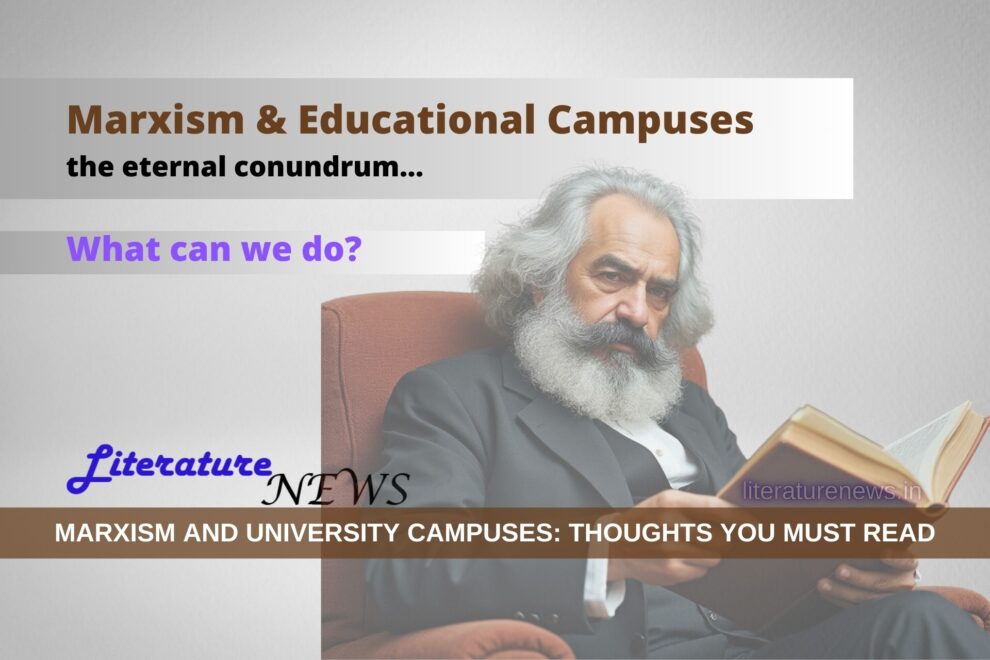Marxism is not new. I remember reading about Karl Marx and his ‘services’ to the causes of people experiencing poverty in class five. However, that was different. Marxism, today, has changed its guise and invaded the classrooms to a great extent. Tell me a subject that’s devoid of Marxism. Marxism in history, Marxism in sociology, Marxism in literature… where it’s not! Let’s discuss Marxism in academia and its ramifications in the contemporary world.
The Ideological Influx in Academia
In an era where ideological convictions permeate public discourse, university campuses stand as microcosms of broader societal debates. Historically viewed as arenas for free thought and intellectual exploration, these institutions have, in recent times, witnessed the increasing presence of Marxist philosophy—a doctrine whose calls for socioeconomic reform resonate with many but raise apprehension among others. The presence of Marxist principles in academia has sparked diverse reactions, with advocates touting it as a tool for critical inquiry. At the same time, critics express fears about ideological imbalance and the potential consequences for students’ future trajectories.
The Role of Marxist Philosophy in Higher Education
Advocates for Marxist philosophy in academic settings argue that it serves as a crucial framework for dissecting societal structures, especially within capitalist systems. They posit that Marxism offers an insightful lens through which students can scrutinise economic inequalities and power dynamics, fostering an informed and socially aware student body. Marxist thought encourages students to question entrenched systems and to critically examine the societal frameworks that govern economic and social relations. This scrutiny, they argue, nurtures a generation of critically minded individuals adept at questioning and reshaping existing systems for the public good. Moreover, amidst global debates on economic disparity, environmental degradation, and social justice, Marxist theory provides a conceptual framework that resonates with current issues, enabling students to constructively contextualise and engage with these pressing matters.
In defending the inclusion of Marxist theory, proponents emphasise the university’s role as a sanctuary for diverse perspectives. They assert that limiting any school of thought, including Marxism, would undercut the core academic principle of free inquiry and intellectual freedom. The idea of safeguarding academic freedom stands at the heart of the case for Marxist philosophy in universities, with proponents insisting that excluding any ideology from academic discourse would compromise higher education’s open, reflective nature. For many advocates, including Marxist thought is not merely about presenting a particular worldview but about enriching the overall academic environment by exposing students to diverse perspectives that spark debate and intellectual growth.

Concerns of Ideological Overreach and Bias
Despite these potential merits, integrating Marxist philosophy into academic settings has raised substantial concerns. Detractors caution against the risks of ideological dominance, arguing that the unchecked proliferation of Marxist doctrine could suppress intellectual diversity and critical engagement with alternative viewpoints. When one ideological framework becomes predominant—particularly one as critical of capitalism as Marxism—critics argue that it risks creating an intellectually monolithic environment where students may be less inclined to explore or respect contrasting perspectives. This environment of intellectual homogeneity, critics suggest, could ultimately stifle critical thinking and produce students who are less open to examining other schools of thought.
Further, there is a concern that Marxist philosophy might be presented as biased, potentially leaning toward indoctrination rather than objective education. In such cases, students could be subtly dissuaded from engaging with differing theories, leading to a narrowing of intellectual horizons. This is particularly problematic in an educational context that ideally nurtures open-minded, independent thinkers. For students preparing to enter a predominantly capitalist workforce, critics argue that an overemphasis on Marxist critique might inadequately equip them with the skills and perspectives necessary for navigating a capitalist economy, potentially impacting their employability and career success. While exploring the faults of capitalism can provide students with valuable insights, some fear that over-reliance on a Marxist framework may leave students unprepared for the pragmatic demands of a world still shaped mainly by capitalist principles.
Balancing Ideological Perspectives in Education
To address these concerns while preserving the academic value of diverse philosophical perspectives, universities must cultivate a balanced educational approach. A curriculum that includes a broad spectrum of economic theories, from capitalism to socialism and emerging economic models, equips students with a nuanced understanding, enabling them to assess and engage with multiple ideological frameworks critically. A diverse curriculum, in turn, supports a balanced perspective that fosters critical thought rather than ideological conformity. Additionally, actively recruiting faculty members with varied ideological backgrounds can enrich students’ academic experience, exposing them to a comprehensive range of viewpoints. Faculty diversity is crucial in broadening students’ intellectual exposure, countering ideological homogeneity tendencies and promoting a richer, more multifaceted education.
Establishing regular debate forums and discussion platforms offers students valuable opportunities to engage with multiple schools of thought in a moderated environment. Such spaces can support healthy intellectual engagement, allowing students to test their ideas against diverse viewpoints constructively and educationally. Universities might also benefit from adopting policies emphasising ideological neutrality in teaching, thus fostering an atmosphere where ideas are presented objectively rather than prescriptively. By encouraging faculty to provide students with analytical tools to form independent judgments, universities safeguard against any single perspective dominating the academic narrative. Beyond formal policies, universities can foster a culture of ideological pluralism through initiatives like interdisciplinary seminars, research funding for underrepresented theories, and conferences on diverse economic models. These practices reinforce the importance of engaging with a broad range of perspectives, supporting students’ intellectual development in a manner that values open-mindedness and critical inquiry.
Conclusion
The presence of Marxist philosophy within university campuses is not inherently problematic; rather, the challenge lies in maintaining a balanced educational environment where ideological diversity is genuinely valued. As intellectual havens, universities must strive to foster an atmosphere where students are encouraged to scrutinise all doctrines, think independently, and engage critically with the world around them. Through a commitment to pluralism, academic freedom, and rigorous debate, higher education institutions can ensure that their graduates emerge as well-rounded, critically engaged individuals capable of navigating the complexities of a world defined by competing ideologies. In this way, universities fulfil their role not as purveyors of ideology but as cultivators of thought, preparing students for a future in which they can make informed and impactful contributions to society.
Ashish
for Literature News





Add Comment